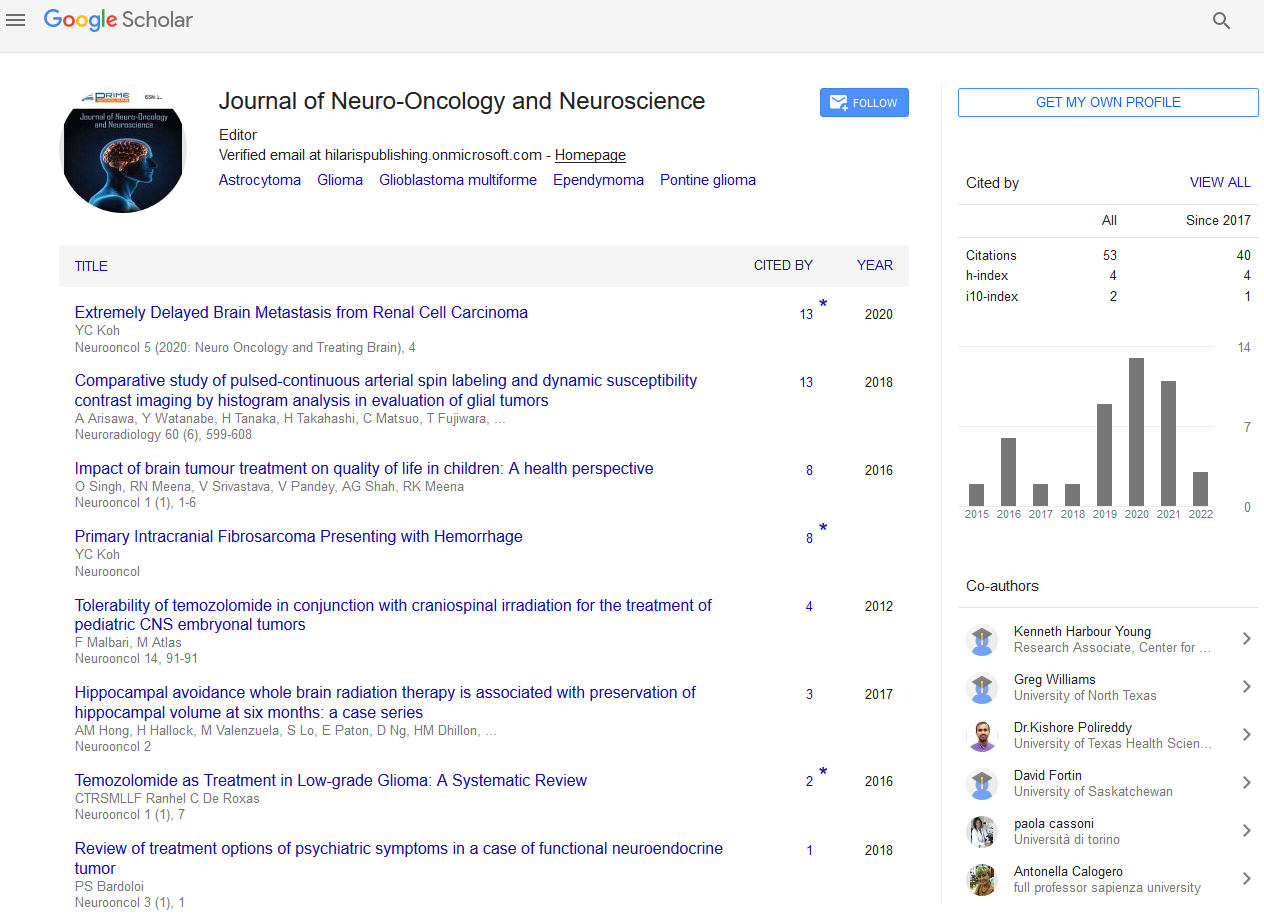Commentary - (2023) Volume 8, Issue 2
Disorder of the Systema Nervosum is Considered a Neurological Disorder
Carme Dinares*
Department of Pathology, Valld Hebron University Hospital, Barcelona, Spain
*Correspondence:
Carme Dinares, Department of Pathology, Valld Hebron University Hospital, Barcelona,
Spain,
Email:
Received: 18-Nov-2022, Manuscript No. IPJNO-22-14852;
Editor assigned: 21-Nov-2022, Pre QC No. IPJNO-22-14852 (PQ);
Reviewed: 05-Dec-2022, QC No. IPJNO-22-14852;
Revised: 21-Jun-2023, Manuscript No. IPJNO-22-14852 (R);
Published:
28-Jun-2023, DOI: 10.21767/2572-0376.23.8.2.019
Description
Disorders that affect the brain, the nerves that run
throughout the body, and therefore the medulla spinalis are
referred to as neurological disorders by medical professionals.
A variety of symptoms can be caused by structural,
biochemical, or electrical abnormalities within the brain,
medulla spinalis, or other nerves. The systema nervosum is
made up of the brain, medulla spinalis, and nerves. All of the
body's functions are under their collective control. You may
experience difficulties moving, speaking, swallowing,
breathing, or learning when a component of your systema
nervosum malfunctions. Your mood senses, and memory can
also be affected. Diseases of the central and peripheral
nervous systems are referred to as neurological disorders.
Specifically, the muscles, myoneural junction, cranial nerves,
peripheral nerves, autonomic systema nervosum, and
medulla spinalis. Neuroinfections, brain tumors, traumatic
disorders of the systema nervosum brought on by head
trauma, neurological disorders brought on by malnutrition,
epilepsy, Alzheimer's disease and other dementias,
cerebrovascular diseases like stroke, migraines, and other
headache disorders, MS, and paralysis agitans are some of
these conditions. Neurological disorders affect many millions
of people worldwide. Stroke kills quite 6 million people every
year. Over 80% of these deaths occur in countries with low or
middle incomes. Epilepsy affects quite 50 million people
worldwide. There are approximately 47.5 million people
worldwide that suffer from dementia, with 7.7 million new
cases occurring annually. Alzheimer's disease is the most
common cause of dementia and may account for 60%-70%
per cent of cases. More than 10% of people in the world
suffer from migraines. The systema nervosum is a specialized,
intricate network. From sight to smell and strolling to talking, our sensory system coordinates, is sensible of and associates
us to our general surroundings. It is important to understand
the symptoms of neurological disorders because it can help
you get the right diagnosis and treatment. Listed below are six
prevalent neurological conditions and methods for identifying
all. Any disorder of the systema nervosum is considered a
neurological disorder. A variety of symptoms can be caused by
structural, biochemical, or electrical abnormalities within the
brain, spinal cord, or other nerves. Instances of side effects
incorporate loss of motion, muscle shortcoming, unfortunate
coordination, and loss of sensation, seizures, disarray,
torment and adjusted degrees of awareness. There are many
known neurological disorders, a number of which are fairly
common while others are uncommon. Neurological
examinations are often used to evaluate them, and therefore
the fields of neurology and clinical neuropsychology can study
and treat them. Preventive measures, lifestyle changes,
physiotherapy or other therapy, neurorehabilitation,
medication, operations by neurosurgeons, and a specific diet
are all examples of interventions for neurological disorders. In
2006, it had been estimated by the world health organization
that neurological disorders and their sequelae (direct
consequences) affect as many as one billion people
worldwide. Health disparities and social stigma/discrimination
were identified as major contributors to the incapacity and its
impact. The systema nervosum can be affected by a variety of
bacterial, viral, and parasitic infections, including Tubercle
bacillus, Neisseria meningitides, west nile virus, zika, and
therefore the Human Immunodeficiency Virus (HIV). An
immune reaction or the infection itself may cause
neurological symptoms.
Citation: Dinares C (2023) Disorder of the Systema Nervosum is considered a Neurological Disorder. Neurooncol. 8:027.
Copyright: © 2023 Dinares C. This is an open-access article distributed under the terms of the Creative Commons Attribution
License, which permits unrestricted use, distribution, and reproduction in any medium, provided the original author and
source are credited.

